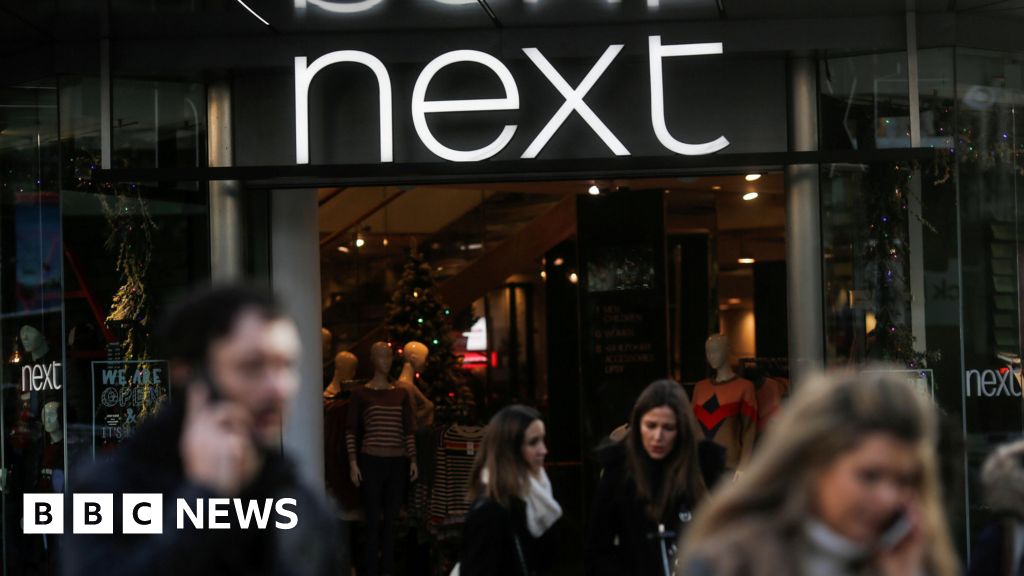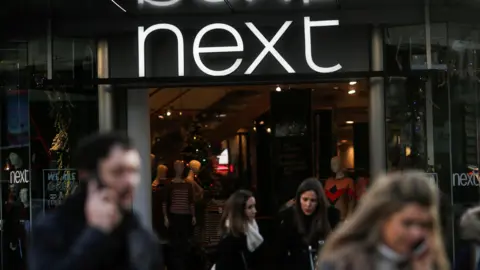Next boss: It will be harder for people to get first jobs

 Reuters
ReutersTax changes announced in the Budget will make it “harder for people to enter the workforce”, according to the boss of retail giant Next.
Lord Wolfson told the BBC that a rise in National Insurance paid by business will hit the retail sector in particular and meant “the axe has fallen particularly hard” on entry-level jobs.
He called on the government to stagger the tax changes over time, rather than introduce them in April, otherwise, jobs or hours will have to be cut.
But a Treasury spokesperson said the Budgetary measures were to “wipe the slate clean” and deliver stability to businesses.
In last October’s Budget, the government increased the rate of National Insurance (NI) paid by employers from April, and also reduced the threshold that employers start paying it at from £9,100 to £5,000.
Businesses are also facing a rise in the National Living Wage in April at double the rate of inflation.
Lord Wolfson, who is a Conservative peer, said these changes would hit those employers with large numbers of lower-paid or part-time workers hardest.
Next’s wage bill is set to rise by £70m, and Lord Wolfson said this would lead to a cut in the number of employee hours worked – either through fewer workers or fewer hours per employee.
He called on the government to lower the NI threshold over time, rather than the few months’ notice employers got in October’s Budget.
He said that while the increase in tax on a £60,000-a-year job is around 2%, the increase for a part-time living wage worker is around 6.5%.
“So the axe has fallen particularly hard on those entry-level, National Living Wage jobs, and that’s where the pain is going to be felt the most.”
Lord Wolfson said it was not just a worry for retailers, but a concern for the economy as a whole. Next received 13 applications for every Christmas job vacancy this year – up 50% on last year.
“My worry is that it’s going to be harder and harder for people to enter the workforce,” he said.
“It’s very difficult to see how such a big increase in the cost of entry-level work is going to result in anything other than a reduction in the number of opportunities available.”
But a spokesperson for the Treasury said more than half of half employers will either see a cut or “no change” in their National Insurance bills.
They added they were they were “creating the conditions” for economic growth through measures including capping the rate of corporation tax and establishing a National Wealth Fund.
The NI and minimum wage measures have triggered criticism from UK companies, who argue the changes run counter to the government’s aim to boost economic growth.
Earlier this month, the British Chambers of Commerce said confidence had “slumped”, with more than half of companies planning to raise prices in the next three months in the face of a “pressure cooker of rising costs and taxes”.

Last year, Next was one of the signatories on a letter from UK retailers to Chancellor Rachel Reeves calling for a rethink to the Budget measures.
The letter said High Street job losses were “inevitable” and also warned that prices would rise and shops would close.
Next made over a billion pounds in profit last year, while other big retailers with large workforces – like Tesco and Sainsbury’s also made bumper profits. Lord Wolfson accepts that they are the “broad shoulders” that the chancellor insisted must bear the brunt of tax rises needed to rebuild public services.
“Government did need to raise taxes. I’ve got nothing against lowering the threshold for NI in principle but the speed at which it is going to happen, the lack of consultation, that is the problem.”
Lord Wolfson also has concerns about a new workers’ rights bill.
This promises to give greater protection from unfair dismissal and “exploitative” zero-hours contracts, with employees able to request a guaranteed hours contract based on hours worked over a period. But that could pose a problem for retailers.
“We offer staff extra hours in the run-up to Christmas. If the legislation is going to mean that those hours have to be contractually binding forever then we just won’t be able to do it at all, it would be impossible.”
He has some advice for the chancellor in her attempts to boost growth and business confidence. Start in your own back yard.
“Over the last five years the government has employed 100,000 more civil servants.
“We can’t go on spending over 40% of GDP on the public sector. It has to become more efficient and if the government can commit to doing that – and deliver it – then I think that will do more for business confidence than anything else.”
Related
A top recruiter says sports marketing roles are hot right…
Jobs are opening up in the sports industry as teams expand and money flows into the industry.Excel Search &
Public employees and the private job market: Where will fired…
Fired federal workers are looking at what their futures hold. One question that's come up: Can they find similar salaries and benefits in the private sector?
Mortgage and refinance rates today, March 8, 2025: Rates fall…
After two days of increases, mortgage rates are back down again today. According to Zillow, the average 30-year fixed rate has decreased by four basis points t
U.S. economy adds jobs as federal layoffs and rising unemployment…
Julia Coronado: I think it's too early to say that the U.S. is heading to a recession. Certainly, we have seen the U.S. just continue t











